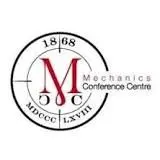Mechanics' Institute, Manchester
Over 100 views on venues4hire.org

Mechanics' Institute, Manchester - Mechanics' Institute, Manchester
To make a booking or enquire about hiring this venue please use the contact details below - Please mention Venues for Hire
0161-236-9336
Bookings Administrator
Use contact form below
Mechanics' Institute, Manchester description
Pub / Restaurant
Medium (1-150)
The Mechanics Institute is a grade II* listed building it is best known as the birthplace of the TUC which was founded in the building in 1868. It is also the birthplace of the Co-operative Insurance Society and UMIST (University of Manchester Institute of Science & Technology)
The founders of the Mechanics' Institute
The small Manchester Mechanics' Institute was established in 1824 entirely through private initiative and funds to teach artisans the basic principles of science by part-time study.
Several Manchester men met in the Bridgewater Arms in High Street to establish the Mechanics' Institute in Manchester, where artisans could be taught by part-time study the basic principles of science - the science being mechanics and chemistry. Of the hundreds of such institutions founded around that time it alone has survived to date as an autonomous body.
The meeting was convened on 7 April 1824 by G Wood, with:
In chair, Sir Benjamin Heywood, a prosperous banker.
Robert Hyde Greg, a cotton mill owner and soon-to-be MP.
Peter Ewart, millwright and engineer.
Richard Roberts, machine tools inventor.
David Bellhouse, a builder.
William Henry, who pioneered scientific chemical industry and developed his business into fizzy drinks.
William Fairburn, the versatile engineer - whose name is associated with water wheels and machinery of every kind and the Britannia tubular bridge, but above all with scientific engineering - was elected first Secretary. He was later knighted.
John Dalton, who became father of Atomic Theory. Became the Vice President in 1840.
Sir Benjamin Heywood, became President from 1824-1841. His son, Oliver Heywood also became President of the Institution and was the first Freeman of the City.
The founders of the Mechanics' Institute
The small Manchester Mechanics' Institute was established in 1824 entirely through private initiative and funds to teach artisans the basic principles of science by part-time study.
Several Manchester men met in the Bridgewater Arms in High Street to establish the Mechanics' Institute in Manchester, where artisans could be taught by part-time study the basic principles of science - the science being mechanics and chemistry. Of the hundreds of such institutions founded around that time it alone has survived to date as an autonomous body.
The meeting was convened on 7 April 1824 by G Wood, with:
In chair, Sir Benjamin Heywood, a prosperous banker.
Robert Hyde Greg, a cotton mill owner and soon-to-be MP.
Peter Ewart, millwright and engineer.
Richard Roberts, machine tools inventor.
David Bellhouse, a builder.
William Henry, who pioneered scientific chemical industry and developed his business into fizzy drinks.
William Fairburn, the versatile engineer - whose name is associated with water wheels and machinery of every kind and the Britannia tubular bridge, but above all with scientific engineering - was elected first Secretary. He was later knighted.
John Dalton, who became father of Atomic Theory. Became the Vice President in 1840.
Sir Benjamin Heywood, became President from 1824-1841. His son, Oliver Heywood also became President of the Institution and was the first Freeman of the City.
Venue suitability
This venue is suitable for the following uses:
Venue facilities
Other venue facilities
We don't currently hold any detailed information about the rooms at this Venue.
If this is your Venue or Hall please use the Adopt link on the right to add more detailed information about this Venue.
If you wish to hire this Venue or Hall please use the contact details on the overview tab.
Please encourage every Venue to take a few minutes to 'Adopt' their listing and add unique content and photos.
